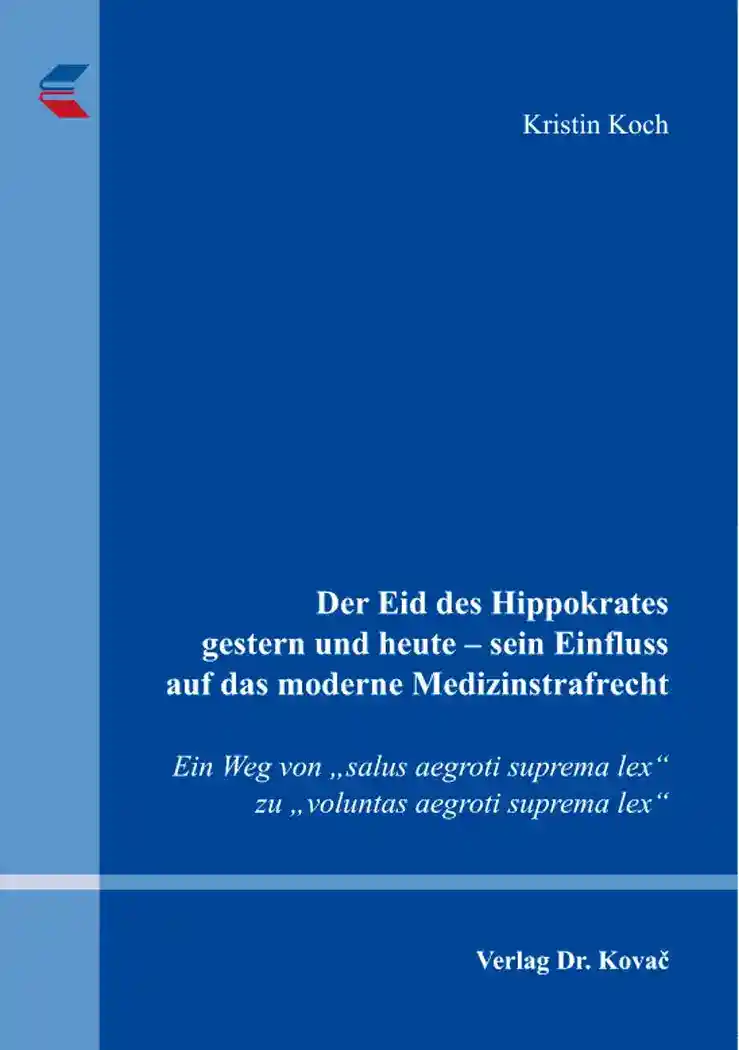Kristin KochDer Eid des Hippokrates gestern und heute – sein Einfluss auf das moderne Medizinstrafrecht
Ein Weg von „salus aegroti suprema lex“ zu „voluntas aegroti suprema lex“
Medizinrecht in Forschung und Praxis, volume 54
Hamburg 2018, 318 pages
ISBN 978-3-8300-9824-9 (print) |ISBN 978-3-339-09824-5 (eBook)
About this book deutschenglish
The Hippocratic Oath, which originates from approx. 400 B.C. and was named after the Greek doctor, Hippocrates of Kos, is viewed to this day as the foundation of medical ethics. While it is certainly at first difficult to identify a direct connection between the oath and the modern law on medical crimes, the oath covers not only the principles of medical ethics but also principles that form the very basis of criminal law in the field of medicine. Examples include the provisions on euthanasia, medical confidentiality, abortion, and the requirement to do no harm to patients.
Due to its paternalistic content and the maxim derived therefrom, “salus aegroti suprema lex” [the well-being of the patient shall be the most important law] – which, particularly from a legal perspective, is outdated – the oath has been the subject of frequent, even justified, criticism. Thus, there have been many attempts over the course of history to amend and update it to reflect modern views, for example in the form of the Declaration of Geneva.
Nevertheless, in spite of all the criticism and advancements, it cannot be ignored that a majority of the key tenets of medical ethics, which this ancient oath once standardized for doctors, contain important foundations of the norms of modern medical criminal law and help shape the legal views in the area of medical criminal law. Accordingly, some pivotal and indispensable standard maxims of medical ethics that are based on this non-binding oath are still valid to this day. In a process lasting many centuries, the rules of medical criminal law, which today impose regulations and sanctions on the conduct of medical practitioners, were developed from these principles. The tenets of medical ethics set out in the oath were thus incorporated into modern medical criminal law, even if they do not match their ancient archetype, as in the case of euthanasia, which the oath prohibits but does not criminalize.
In addition to considering the origin and development of the Hippocratic Oath, this treatise will also describe the Oath’s influence on modern law. Furthermore, the author will address the lingering conflict to which doctors can be exposed: i.e. ethics according to Hippocratic principles require that “the well-being of the patient is the highest dictate,” but the law and especially current case law demands absolute respect for patient autonomy and hence, simultaneously, for the notion that “the patient’s will is the highest dictate.”
Keywords
Ärztliche SchweigepflichtArzthaftungsrechtArztstrafrechtHaftungHippokrates von KosHippokratischer EidMedizinische EthikMedizinrechtMedizinstrafrechtPatientenautonomieRechtsethikRechtswissenschaftSchwangerschaftsabbruchSterbehilfeIhr Werk im Verlag Dr. Kovač

Möchten Sie Ihre wissenschaftliche Arbeit publizieren? Erfahren Sie mehr über unsere günstigen Konditionen und unseren Service für Autorinnen und Autoren.
